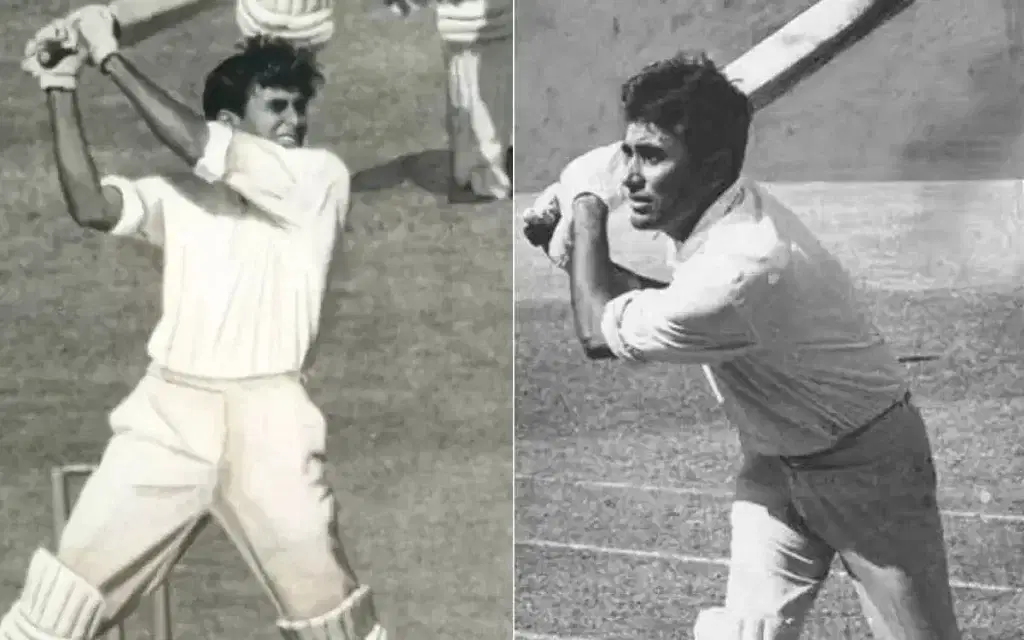In the pantheon of Indian sporting honours, the Arjuna Award holds a special place. Established in 1961, it is the second-highest sporting award in India, celebrating athletes showcasing skill, sportsmanship, and leadership. In cricket, a sport deeply woven into the fabric of Indian culture, the award acknowledges the immense contributions of players who have etched their names into history.
This prestigious accolade is more than just a recognition; it symbolises the relentless pursuit of excellence and the spirit to inspire future generations. Cricketers honoured with the Arjuna Award have not only pushed boundaries on the field but have also captivated the nation with their performances, leaving a lasting legacy for fans and fellow players alike.
What is the Arjuna Award?

The Government of India introduced the Arjuna Award for cricket to recognise outstanding achievements in national sports. As a tribute to the spirit of Arjuna, the legendary warrior from the epic Mahabharata known for his unparalleled focus and dedication, the award celebrates athletes who demonstrate similar qualities in their sporting endeavours.
The Arjuna Award recipients receive a bronze statuette of Arjuna, a certificate, a ceremonial dress, and a cash prize of Rs 15 lakh, symbolising the honour and esteem associated with this accolade. The evaluation criteria for the award include consistent performance at the international level over the previous four years, leadership qualities, and the athlete’s ability to act as a role model to up-and-coming players.
It embraces all sports, but in cricket, the award signifies exceptional contributions to a game much loved across the Indian subcontinent. The recognition motivates players to strive for greatness and inspires younger generations to emulate their heroes.
History of Arjuna Award in Cricket
Since its inception, the Arjuna Award for cricket has celebrated the achievements of cricketers who have significantly contributed to India’s national and international cricket legacy. The first cricketer to receive this prestigious honour was Salim Durani in 1961, whose charismatic performances and match-winning abilities set the stage for others to follow.
As the years progressed, numerous cricketing legends have been immortalised through this award. Players like Sachin Tendulkar, who redefined cricketing excellence, and Kapil Dev, whose leadership brought home the 1983 World Cup, are just a few luminaries who have been recognised. The award has honoured cricketers from various strands of the game—whether it’s a batsman with an impeccable technique like Sunil Gavaskar, a bowler with strategic acumen like Anil Kumble, or an all-rounder with a dynamic presence like Ravi Shastri.
The history of the Arjuna Award in cricket is not just a list of names; it is a chronicle of the sport’s evolution in India. It reflects a timeline of perseverance, breakthroughs, and iconic moments that have electrified millions.
Through their contribution, each awardee has enriched Indian cricket culture, adding dimensions of passion, grit, and accomplishment to its narrative. As cricket continues to evolve, the Arjuna Award remains a beacon of prestige, urging players to push boundaries and achieve extraordinary feats for themselves and the nation.
Full List of Arjuna Award Winners in Indian Cricket History
The most recent recipient of the Arjuna Award in cricket is Mohammed Shami. He was honoured in 2023 for his outstanding contributions as a fast bowler, particularly in top cricket tournaments.
Total 58 cricketers have been honored with the Arjuna Award. Here is a list of cricketers who have been awarded with the Arjuna Award over the years, each leaving an indelible impact on Indian cricket:
| Year | Cricketer(s) | Notable Contributions |
| 2023 | Mohammed Shami | Crucial fast-bowler with impressive performances for Team India. |
| 2021 | Shikhar Dhawan | Known for explosive batting starts in cricket formats. |
| 2020 | Deepti Sharma, Ishant Sharma | An all-rounder in women’s cricket (Deepti) and expertise in Test cricket (Ishant). |
| 2019 | Ravindra Jadeja, Poonam Yadav | All-round abilities (Jadeja) and crafty leg-spin (Poonam) pivotal in matches. |
| 2018 | Smriti Mandhana | Elegant strokeplay led to India’s international success in women’s cricket. |
| 2017 | Harmanpreet Kaur, Cheteshwar Pujara | Kaur’s powerful hitting inspires new generations; Pujara anchors innings. |
| 2016 | Ajinkya Rahane | Technically sound batting and leadership qualities. |
| 2015 | Rohit Sharma | Effortless brilliance in batting with multiple double centuries. |
| 2014 | Ravichandran Ashwin | Renowned spinner pivotal in India’s Test successes. |
| 2013 | Virat Kohli | Modern cricket excellence with aggressive style and top-scoring capabilities. |
| 2012 | Yuvraj Singh | The fighter is known for match-winning performances, Man of the Series in the 2011 World Cup. |
| 2011 | Zaheer Khan | Premier fast bowler known for their strategic mind and critical breakthroughs. |
| 2010 | Jhulan Goswami | Renowned for pace and leadership in women’s cricket. |
| 2009 | Gautam Gambhir | Steadfast batting is pivotal in major tournaments. |
| 2006 | Anjum Chopra | Leadership excellence in women’s cricket, setting inspiring milestones. |
| 2005 | Anju Jain | Exemplary wicketkeeping and commitment to nurturing future talents. |
| 2003 | Mithali Raj, Harbhajan Singh | Establishing women’s cricket and mastery of spin (Harbhajan). |
| 2002 | Virender Sehwag | Fearless batting with historic triple Test centuries. |
| 2001 | VVS Laxman | Elegant and match-saving innings captured cricket fans’ hearts. |
| 2000 | Venkatesh Prasad | Strategic deliveries and vital breakthroughs for India. |
| 1998 | Rahul Dravid, Nayan Mongia | Dravid’s batting anchor role and Mongia as an expert wicketkeeper. |
| 1997 | Sourav Ganguly, Ajay Jadeja | Ganguly’s leadership and Jadeja’s fielding redefined team ethos. |
| 1996 | Javagal Srinath | Pace icon with relentless aggression and influence on young bowlers. |
| 1995 | Anil Kumble | Iconic spin wins and record ten-wicket Test innings. |
| 1994 | Sachin Tendulkar | Cricket’s icon with unmatched records, setting new standards globally. |
| 1993 | Manoj Prabhakar, Kiran More | Prabhakar’s versatility and More’s adept wicketkeeping fortified the team. |
| 1989 | Madan Lal | Crucial all-round contribution to India’s historic 1983 World Cup win. |
| 1986 | Sandhya Agarwal, Mohammad Azharuddin | Contributions to women’s cricket and elegant wristwork (Azharuddin) enhanced India’s cricket. |
| 1985 | Shubhangi Kulkarni | Pioneer in women’s cricket, influential leadership and spin. |
| 1984 | Ravi Shastri | Known for all-round prowess and revitalisation of Indian cricket strategies. |
| 1983 | Diana Edulji | A trailblazer in women’s cricket with effective spinning skills. |
| 1982 | Mohinder Amarnath | Strategic understanding was pivotal in the 1983 World Cup victory. |
| 1981 | Dilip Vengsarkar | Elegant batting and overseas innings enriched India’s cricket eras. |
| 1980 | Chetan Chauhan, Syed Kirmani | Solid partnerships (Chauhan) and exceptional wicketkeeping (Kirmani). |
| 1979 | Kapil Dev | The perfection of all-around excellence led India to a 1983 World Cup win. |
| 1977 | Gundappa Viswanath | Graceful batting contributed to memorable Test victories. |
| 1976 | Shantha Rangaswamy | Broke new ground for Indian women’s cricket as a leader and player. |
| 1975 | Sunil Gavaskar | Precise batting technique and record-setting achievements in Test cricket. |
| 1972 | Bhagwat Chandrasekhar, Eknath Solkar | Chandrasekhar’s spin and Solkar’s fielding were pivotal in the victory. |
| 1971 | Srinivasaraghavan Venkataraghavan | Integral to India’s spin strategy and post-cricket umpiring contributions. |
| 1970 | Dilip Sardesai | Key innings during challenging tours laid the groundwork for Indian cricket evolution. |
| 1969 | Bishan Singh Bedi | Spin bowling paragon renowned for classical style and strategic thinking. |
| 1968 | Erapalli Anantharao Srinivas | A masterful spinner vital to Indian bowling strategies. |
| 1967 | Ajit Wadekar | Tactical leadership led India to first overseas series victories. |
| 1966 | Chandu Borde | Significant innings and competent leg-spin that fostered Indian cricket growth. |
| 1965 | Vijay Manjrekar | Renowned for technical batting against challenging opponents. |
| 1964 | Mansoor Ali Khan Pataudi | Revolutionised Indian cricket with progressive leadership. |
| 1961 | Salim Durani | Match-winning all-rounder known for his charismatic presence on the field. |
Male Cricketers
The Arjuna Award for cricket has honoured numerous male cricketers who have significantly contributed to Indian cricket. Here’s a selection of those legends:
| Year | Cricketer | Notable Contributions |
| 1961 | Salim Durani | Match-winning all-rounder known for his charismatic presence on the field. |
| 1975 | Sunil Gavaskar | Precise batting technique with record-setting achievements in Test cricket. |
| 1979 | Kapil Dev | Iconic leader who led India to its first World Cup win in 1983. |
| 1994 | Sachin Tendulkar | Cricket’s beloved icon with unmatched records setting new global standards. |
| 2000 | Venkatesh Prasad | Cleverly strategised deliveries and significant contributions to India’s bowling lineup. |
| 2013 | Virat Kohli | Modern cricketing excellence is known for its aggressive style and consistent top-scoring. |
| 2015 | Rohit Sharma | Effortless batting brilliance with multiple double centuries in ODIs. |
| 2016 | Ajinkya Rahane | Recognised for technically sound batting and adept leadership. |
These exemplary cricketers represent the dedication and skill that the Arjuna Award seeks to acknowledge. Their influence continues to shape the ethos of Indian cricket and inspire aspiring players globally.
Female Cricketers
The Arjuna award for cricket also celebrates the remarkable achievements of female cricketers who have excelled and inspired many:
| Year | Cricketer | Notable Contributions |
| 1976 | Shantha Rangaswamy | Broke new ground for Indian women’s cricket with influential leadership. |
| 1983 | Diana Edulji | Trailblazing figure in women’s cricket, noted for her effective spin and advocacy for the game. |
| 2005 | Anju Jain | Renowned for exemplary wicketkeeping and ongoing contribution to nurturing future cricket talents. |
| 2010 | Jhulan Goswami | Admired for her sharp pace and accuracy, serving as an influential leader in women’s cricket. |
| 2018 | Smriti Mandhana | Acclaimed for her elegant stroke play, leading to significant successes in international women’s cricket. |
| 2019 | Poonam Yadav | Known for her crafty leg-spin, taking pivotal wickets in crucial matches. |
These female cricketers have achieved personal success and significantly contributed to elevating the status and visibility of women’s cricket in India and on the global stage.
The First Cricketer to Win the Arjuna Award

The journey of recognising cricketing excellence with the Arjuna Award began with the legendary Salim Durani in 1961. Salim Durani was celebrated for his compelling charisma on the field and unmatched ability to change the course of a match with both bat and ball. With his graceful yet powerful gameplay, Durani captured the hearts of cricket enthusiasts nationwide.
Born in Kabul, Afghanistan, Durrani joined the Indian cricket team and quickly became known for his all-around capabilities. He possessed the rare knack for delivering crucial performances, particularly when the stakes were high—a quality that endeared him to fans and teammates alike. His ability to hit a six on-demand kept the audiences on their toes, and his left-arm orthodox spin proved to be instrumental in pivotal matches.
The Arjuna Award affirmed Durani’s status as a cricketing icon and set a precedent for future players, symbolising the bridge between skill and recognition. It highlighted a cricketer’s impact not just through statistics but through moments of brilliance that could influence games immeasurably.
Durani’s influence on Indian cricket has been profound. He paved the path for aspiring cricketers to dream big and aim for national recognition. His legacy, wrapped in charm and mastery, inspires cricketers who aspire to leave their mark on the sport.
Criteria for Selection for the Arjuna Award
Selection for the Arjuna Award encompasses a range of criteria designed to recognise not only excellence in sport but also the holistic qualities of the athlete. At its core, the award seeks to celebrate athletes who have achieved consistently high performance levels at national and international competitions over a sustained period. This consistent excellence is a testament to their dedication, skill, and determination.
Equally important in the selection process are the leadership qualities exhibited by the athlete.
This criterion ensures that recipients are those who can inspire their peers and younger generations through their conduct and actions both on and off the field. The award recognises those who can be considered role models, demonstrating integrity, sportsmanship, and a commitment to their sport.
The selection process for the Arjuna Award is comprehensive, involving scrutinising an athlete’s career, achievements, and contributions to the sport. Not merely past achievements are taken into account, but also the potential for the awardees to act as inspirational figures for future generations.
By honouring such sports personalities, the Arjuna Award continues to uphold a legacy of excellence, commitment, and the spirit of sportsmanship within the diverse and vibrant tapestry of Indian sports.
Impact of Arjuna Award on Indian Cricket
The Arjuna Award has had a profound impact on Indian cricket, both in recognising individual excellence and in promoting the sport’s growth across the nation. By honoring cricketers who have displayed exceptional talent and sportsmanship, the award has brought national attention to these athletes’ achievements, enhancing their prestige and societal recognition.
Receiving the Arjuna Award validates players’ hard work, dedication, and contribution to the game. It motivates elite performers to continue striving for excellence and inspires upcoming players to pursue their cricketing dreams with vigour. The recognition with the award often opens up further opportunities for these athletes, both within and outside the sporting world.
Beyond individual achievement, the Arjuna Award emphasises cricket’s social and cultural significance in India, reinforcing its status as a national passion. By celebrating cricketers from different eras, the award has chronicled the evolution of the game in India, highlighting milestone achievements and the sport’s continuous progress.
This celebration of cricketing excellence propels the sport’s development, encouraging investment in infrastructure and training facilities that benefit future generations and the broader sports community.
Famous Arjuna Awardees in Cricket
Here are some famous cricketers who have been honoured with the Arjuna Award, each known for their unique contributions to the game:
- Kapil Dev (1979): Renowned for his all-around prowess and captaining India to its historic 1983 World Cup victory.
- Sunil Gavaskar (1975): A legendary batsman known for his exceptional technique and significant contributions to Indian cricket.
- Sachin Tendulkar (1994): Widely regarded as one of the greatest batters also know as god of cricket, he was revered for his record-breaking career.
- Anil Kumble (1995): Celebrated for his tenacious spin bowling and leadership on and off the field.
- Virat Kohli (2013): Modern cricket’s icon known as king of cricket for his aggressive play and leadership skills.
- Mithali Raj (2003): A trailblazer in women’s cricket, known for her unmatched batting brilliance.
- Jhulan Goswami (2010): Admired for her sharp bowling skills and influence in women’s cricket.
These awardees represent a cross-section of Indian cricket’s luminaries, whose contributions have significantly shaped the sport’s legacy in the country.
Comparison: Arjuna Award and Other Sports Awards in India
The following table provides a comparison between the Arjuna Award and other prominent sports awards in India, highlighting their purpose, criteria, and significance:
| Award Name | Established | Purpose | Criteria |
| Arjuna Award | 1961 | Recognising outstanding performance in sports. | Consistent performance at the international level, leadership, and potential to inspire. |
| Rajiv Gandhi Khel Ratna | 1991 | Acknowledging the highest sporting honour in India. | Exceptional performance over four years across international events. |
| Dronacharya Award | 1985 | Honouring contributions of coaches in sports. | Consistent coaching success at the national and international levels. |
| Dhyan Chand Award | 2002 | Lifetime achievements in sports and contributions. | Significant contribution to sports through lifetime achievements. |
Star it if you find it helpful.

